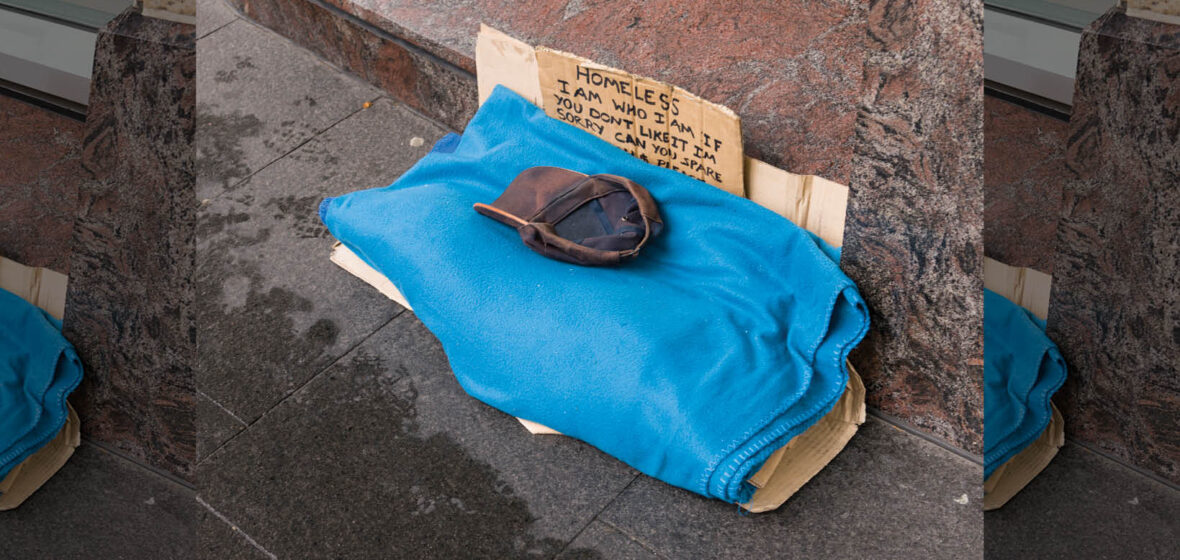“People facing high levels of disadvantage are often cynical and distrustful of the legal system and anything they associate with ‘government’ in general.”
The legal issues faced by people experiencing homelessness often reflect the transient and sometimes chaotic nature of their lives.
For people experiencing chronic homelessness and living on the streets, legal issues can quickly accumulate. People sleeping rough are often given “move on” directions or targeted for searches by police. When interactions escalate, that can result in charges for offensive language, resisting police or minor drug possession. If an arrest follows, people may be refused bail if they lack identity documents or a fixed address.
But homelessness is not just rough sleeping. It includes inadequate, unstable arrangements where a person might have a “roof over their head” but do not have some of the essential elements of a home. The Australian Bureau of Statistics (ABS) defines homelessness as a situation where “a person does not have suitable accommodation alternatives” and “their current living arrangement is in a dwelling that is inadequate, or has no tenure, or … their initial tenure is short and not extendable.”
People experiencing homelessness tend to face legal issues symptomatic of their severe socio-economic disadvantage. Accumulated fines and debt, problems accessing social security, housing-related issues, domestic and family violence, and criminal charges related to poverty and drug and alcohol use can be intertwined challenges that exacerbate each other.
Lack of safe and stable housing quickly affects every aspect of a person’s life. It makes everything difficult. It magnifies existing issues and creates others. As author Matthew Desmond argues in Evicted: “Decent, affordable housing should be a basic right for everybody … The reason is simple: without stable shelter, everything else falls apart.”
The Public Interest Advocacy Centre (PIAC) provides legal assistance to people experiencing or at risk of homelessness through the Homeless Persons Legal Service (HPLS) and the Women’s Homelessness Prevention Service (WHPS). Our services strive to address the legal issues that contribute to people’s homelessness and advocate for change that addresses the structural causes of homelessness. But as lawyers, we cannot do this alone.
People experiencing homelessness are often marginalised and disadvantaged. They face intersecting legal and social issues, which commonly include issues with credit, debt and fines, mental health conditions leading to contact with police, inadequate housing and risk of eviction. Effective responses demand a collaborative and integrated response from lawyers and other community service professionals, working together to resolve legal and non-legal issues within their areas of expertise.
What does it feel like to be homeless?
It’s 5am and you wake up. Or rather, you get up, because you didn’t really sleep. Someone got to your usual spot first last night and claimed it. You had to find somewhere new and weren’t sure if it was safe. You’re hungry and cold. You received a move on order yesterday in Kings Cross. The police said it was because you were there to buy drugs. You don’t use anymore, but you need your methadone maintenance treatment, or you’ll start to withdraw. The clinic is in the Cross, so it’s either breaking the order or getting nausea, aches and diarrhoea out on the streets. Free lunch is offered around the corner, but only for half an hour, and at the same time as the clinic appointment. You won’t be able to make it unless you take the train – and you don’t have money for a ticket. You already have $4,000 in unpaid fines. You think you may as well risk it.
Or maybe you’re a victim of domestic violence living in temporary accommodation. You’re feeling scared today because your abusive ex-partner may have found out your new address. Maybe it’s just paranoia: your mental health has deteriorated lately. But he has done it before. You have to go to the Housing Office, but you lost your ID through moving around so much. They always say you don’t qualify for the priority list anyway. And that it’s a ten-year wait. What you want most is to regain custody of your children. But without adequate housing you can’t apply for that. And without custody, you can’t apply for a social housing property big enough for your family. You also have substantial debt and it was too challenging to access victims’ compensation. Where do you start?
Leaving legal issues unaddressed is not a long-term solution. But the immediate, practical challenges faced by people experiencing homelessness largely explain why some people wait so long to seek assistance or are unable to go through legal processes. Integrated services supporting the diverse and complex needs of people experiencing homelessness are needed to break the cycles of homelessness and contact with the criminal justice system.
“Credit issues, gambling or substance use disorders, and homelessness-related fines such as fare evasion on public transport can cause and prolong homelessness.”
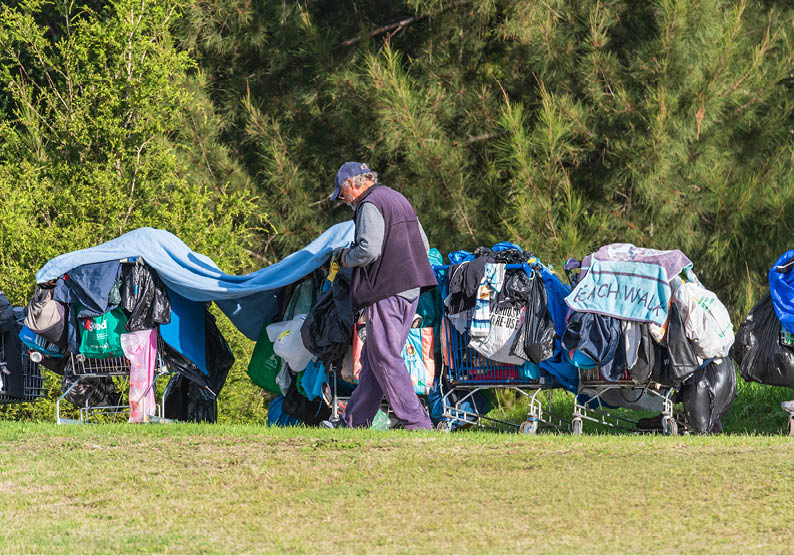
Criminalising homelessness and disadvantage
The legal and non-legal needs of people experiencing homelessness are as varied and complex as their circumstances. They can be both causes and symptoms of homelessness, compounding or prolonging it.
There are several common issues that HPLS and other community legal services deal with daily in our day-to-day work supporting people experiencing homelessness. We focus not only on solving immediate legal issues for an individual client but also on changing systems and laws that create cycles of disadvantage and homelessness. To do this effectively, we must understand the full range of issues our clients face and the underlying causes of them.
People experiencing disadvantage often face intersecting legal and social issues that are complex and intertwined. Financial stress can contribute to family violence. Family breakdown creates direct legal costs and additional housing costs. Many of our clients live with mental health conditions that are exacerbated by homelessness and housing insecurity. Legal issues themselves also have detrimental health, financial and social impacts on peoples’ lives.
The added costs of disadvantage
Accumulated debt is a common factor pushing people into homelessness. Many people in insecure housing situations rely on social security payments to meet their basic needs. When those payments are not enough to cover essentials like rent, food, electricity and transport, debt can quickly become crippling and force a person out of their home.
After a person loses their accommodation, related debt can follow and stifle efforts to rebuild their life. For example, a person can be classified as an “unsatisfactory former tenant” by the Department of Communities and Justice for rent arrears or damage caused to a social housing property (including for damage by perpetrators of domestic violence, for which the victim is held responsible). This is a common barrier to people re-entering social housing.
Credit issues, gambling or substance use disorders, and homelessness-related fines such as fare evasion on public transport, can cause and prolong homelessness.
Ashley* is a 29-year-old woman who came to HPLS with over $10,000 of unpaid fines, mostly for sleeping on a train without a ticket. She had been kicked out of home and did not have anywhere to stay. She tried couch-surfing and sleeping in parks but sleeping on a train felt safer. Ashley could not afford a ticket because her JobSeeker payment barely covered the cost of food, medication, shoes (which often got stolen while she slept) and other essentials. Ashley relied on the support of homelessness services to get meals, showers, clothing, laundry and other supports.
HPLS worked with Ashley’s caseworkers to have the fines waived. Ultimately, we were successful in getting more than 35 fines cancelled. The people in our community most likely to accumulate debilitating debt often have the least capacity to deal with creditors to resolve their situation. Community legal services, including ours, play a critical role in negotiating payment plans, working with creditors to waive or reduce amounts owed, or supporting people to access financial hardship repayment arrangements under credit laws.
In NSW, we can also help people access the Work and Development Order (WDO) scheme. WDOs allow fines to be paid by doing activities such as unpaid work, completing a course or receiving treatment. Eligible people include people experiencing homelessness or drug and alcohol addiction, or people with a mental health condition.
For an overwhelming majority of people who are homeless or at risk of becoming homeless, social security payments are their only source of income. For some people, barriers to access prevent them from receiving any entitlements at all.
The mutual obligations requirement for JobSeeker payments can be impossible to meet without a secure home or because of difficult and fluctuating circumstances such as injury or sickness, episodic mental illness, short term care duties or frequently moving to follow unstable employment or accommodation opportunities. Securing exemptions from those obligations is possible but very difficult without legal assistance. For the Disability Support Pension, the complexity of the eligibility criteria, the rigidity of the assessment process and difficulties obtaining medical evidence are all commonly reported barriers. Without income, people experiencing homelessness must rely on food and other street-based services to meet their basic needs. This doesn’t just take time, it also creates a risk homelessness will become entrenched and long term. Some people can become used to relying on street-based services and settle into a “homelessness lifestyle”. Academic research shows that multiple episodes of homelessness and absence of income leads some people to experience homelessness as a “way of life”.
Public space offences
People sleeping rough are very likely to have been charged with “public space offences”, which include drinking in public, drug possession, offensive language or conduct and loitering.
Even when they have not committed any offences, these people are more likely to be approached by police or others enforcing regulations, and experience negative interactions. This often leads to the “trifecta” charges of offensive language, resisting arrest and assault.
Nick* is an elderly Aboriginal man who had been sleeping rough for several years. He was sitting outside a supermarket when workers from a local council asked him to pack his belongings and move on. Nick felt the workers had not treated him respectfully in past interactions. He got angry and refused to leave, then attacked one of the workers, causing harm. Nick was sentenced to a Community Corrections Order.
Council workers have the right to be safe at work and Nick should not have attacked them. But council workers do not have the right to issue move on orders; these can only be issued by police. And Nick had nowhere else to go.
This unfortunate situation might have been avoided by following best practice guidelines like those found in the NSW Government’s Protocol for Homeless People in Public Places. The Protocol has been informed by consultation with StreetCare, a group of advocates with lived experience of homelessness who are supported by PIAC.
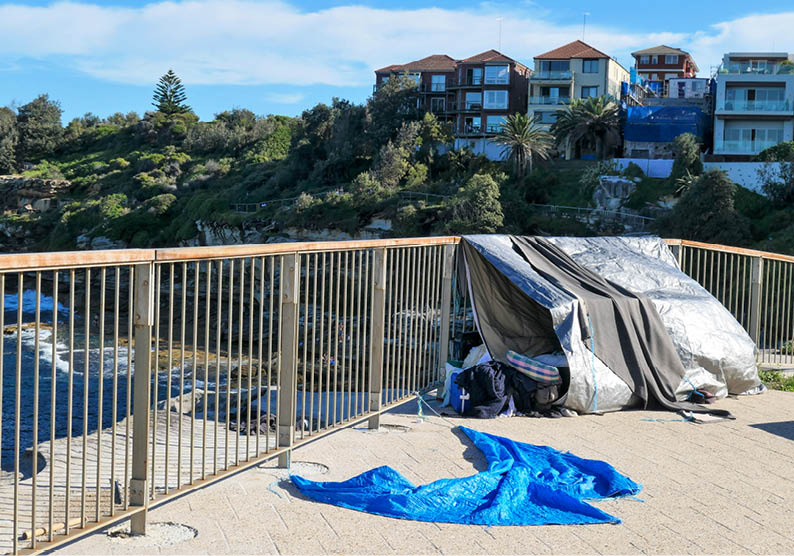
The Protocol gives practical guidance to avoid situations that result in criminal charges, which create another barrier to escaping homelessness. It advises avoiding unnecessary interactions, developing rapport and leaving people experiencing homelessness alone when they use public places.
Minor public space offences, which are largely a consequence of homelessness, can prolong and compound homelessness.
Supporting individual clients to challenge unfair charges can only do so much. Legal services like HPLS have long advocated for better use of police discretion, so people are not unnecessarily charged in the first place and trapped in a cycle of harmful interactions with the justice system. As we documented in PIAC’s 2021 report ‘Policing Public Space: The experiences of people sleeping rough’, repeated, negative and invasive police interactions can have a damaging effect on people experiencing homelessness, many of whom have experienced trauma and abuse. It can lead to people feeling further marginalised, creating a barrier to engagement with services and recovery.
Double punishment: homelessness and bail
The NSW bail regime is unfair for people experiencing homelessness. In our experience, police are more likely to refuse bail to people experiencing homelessness, even for minor offences where there is little likelihood of a custodial sentence. Stricter bail laws that have reversed the onus of proof and created “show cause” offences also mean more people end up in prison for minor offences that will most likely not result in custodial sentences.
Being held on remand can also cause homelessness, which can make subsequent bail applications more difficult, triggering a cycle of homelessness and incarceration.
David suffers from chronic delusion disorder and has spent years between hospital, prison and unstable housing situations. He became aggressive in a shop when he was unwell and was charged with affray. When he was refused bail, he lost his housing which a support service had spent a long time helping him secure, because he was absent and could not pay his rent. HPLS lodged a release application with the Supreme Court but it became clear that David was not going to be released without an address.
HPLS spent hours trying to get David housing with relevant support agencies but none could take him, because they were full, or because David was banned due to his challenging behaviours. Eventually, a boarding house was found through coordinated work with a local support service and David got bail.
Cases like David’s show the need to provide people with a range of support services and not just legal assistance. Without housing or mental health supports to address the underlying causes of challenging behaviours, people cannot meet bail conditions, or tend to re-offend or break bail conditions such as abstaining from drugs and alcohol.
A system stacked against people in the margins
People experiencing homelessness face barriers to participating in the legal process and obtaining legal assistance. This is particularly so for those most marginalised in society, with complex and chronic histories of street homelessness and incarceration.
The transient, sometimes chaotic nature of their lives makes it difficult for them to attend court and follow court process. This can lead to a warrant being issued for their arrest or their case being heard in their absence, with poor outcomes including harsher sentences.
Many people experiencing homelessness are constantly forced to engage with “systems” such as housing and homelessness services, social security, child protection services, out of home care, health services and police. While some interactions are positive, these systems are rarely equipped to provide services to people with complex needs, who are often coping with trauma. This causes many people experiencing homelessness to be wary – and weary – of ‘the system’ and any administrative, legal-looking and formal processes.
People facing high levels of disadvantage are often cynical and distrustful of the legal system and anything they associate with “government” in general. Literacy issues can also create challenges. The NSW Civil and Administrative Tribunal (NCAT), which is the forum used to resolve residential tenancy disputes, is difficult to use as a self-represented person, especially where other parties (generally landlords, including the NSW Land and Housing Corporation, which manages public housing) are more educated or professionally represented.
“Working in an integrated practice not only increases the likelihood of the client receiving a trauma-informed, holistic service, but it also allows professionals to focus on their area of expertise.”
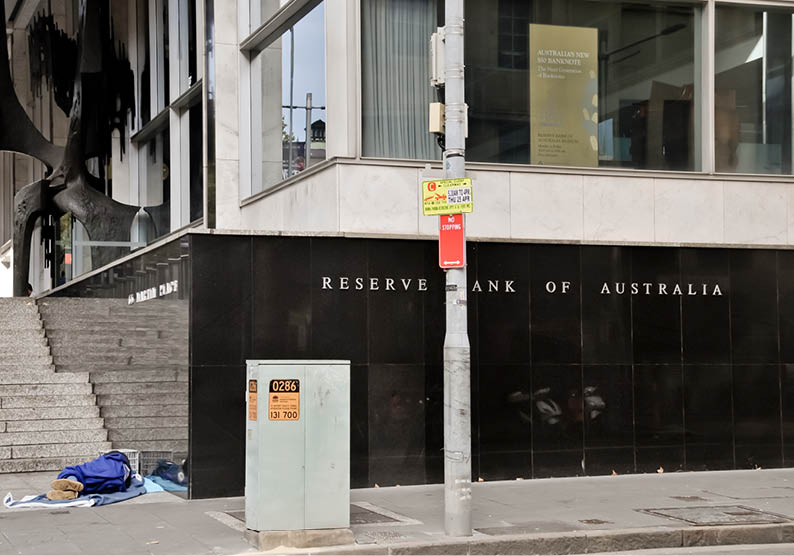
Specialist services are essential for people in these circumstances to be able to participate in the legal process, and to be afforded procedural fairness, legal support and access to justice.
For our lawyers at the HPLS, staying in contact with clients long enough to resolve their legal issues is a major challenge. Over the last year, nearly a quarter of the case files closed by HPLS were closed because of “loss of contact” – showing how commonly legal issues are left unresolved. Given the multitude of issues people experiencing homelessness are facing this is understandable but also potentially avoidable.
Lawyers cannot solve the problem alone. To improve outcomes, we need to work within a system that integrates social and legal supports, a system that considers a client’s whole circumstance and not just their immediate legal need.
In the world of community legal centres this approach has become known as “integrated practice” and involves lawyers and other allied professionals working together. It is particularly beneficial for clients who are disadvantaged, and it has been effective in a wide range of settings including personal injury law firms, the Office of Public Prosecutions and assistance for people giving evidence in Royal Commissions.
Working in an integrated practice not only increases the likelihood of the client receiving a trauma-informed, holistic service, but it also allows professionals to focus on their area of expertise, knowing the clients’ other needs are being addressed by a professional specialised in that area. Integrated practice has been found to be an important means of improving access to justice, addressing the underlying causes of clients’ legal issues, and preventing legal issues from reoccurring or escalating.
Getting it right: integrated and trauma-informed responses
Co-location is a model of integrated practice used by many community legal centres (CLCs). Offering legal services at the same place where people experiencing homelessness can access other supports, such as meals, laundry facilities and healthcare, increases the likelihood they get legal help.
This outreach model allows our lawyers to meet people where they are at rather than expect them to proactively look for legal help. It also provides opportunities for our lawyers to work with staff from the host agencies who have often known clients longer and have built relationships of trust. The unique relationship that host agencies have with their clients is an invaluable asset: it is often how our lawyers maintain contact with clients and ensure they attend court.
Support workers at host agencies can also provide non-legal support that can take a client a step closer to resolving their legal issues.
Mark* had a lengthy criminal record and a looming court date, but HPLS lawyers were not available to represent him. Mark had an intellectual disability and no phone, so struggled to attend court and advocate for himself. Under our direction, a support worker was able to assist him to provide the court with evidence that he had sought legal help and required an adjournment, which meant HPLS lawyers could represent him at a later date and resolve his criminal charges.
Legal services also have opportunities to bring multidisciplinary expertise in-house. At HPLS, a community caseworker assists with filling out forms, gathering information, making referrals and providing other practical non-legal support. This allows lawyers to stay focused on legal matters while ensuring clients have the broader support they need to remain committed to resolving their legal issues.
The Commonwealth Government’s National Framework for Legal Assistance recognises that a collaborative, integrated and system-wide approach makes the path towards justice easier to navigate for clients and we have seen this borne out many times.
Our caseworker provides clients with longer-term support, enabling a relationship of trust. Her support makes it more likely that a client will remain working with the lawyers to resolve their legal issues.
This multidisciplinary approach provides an opportunity for lawyers and allied professionals to build their capacity – allied professionals gain a better understanding of the legal processes and lawyers get a better understanding of effective referral pathways and trauma informed approaches.
“The legal issues that prolong and exacerbate homelessness and risk of homelessness are unlikely to change anytime soon. But how we respond to them can.”
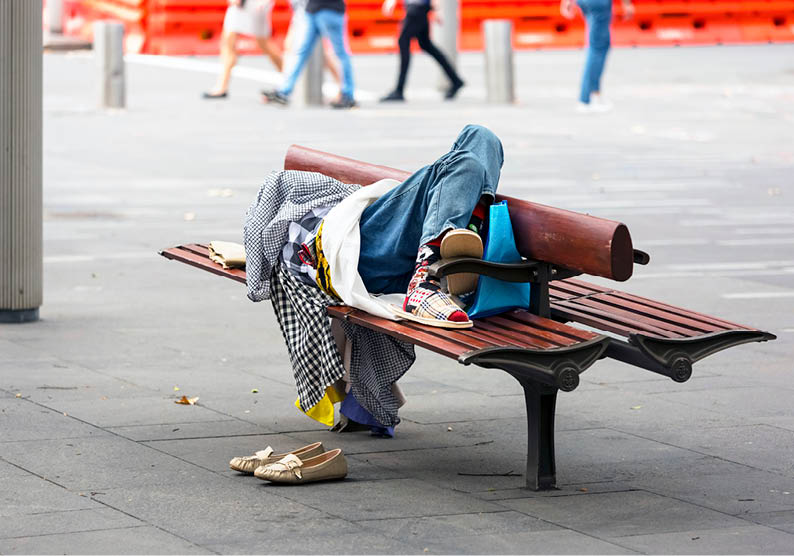
Challenges of integrated practice
Moving from a conventional legal service model with a problem-focused approach to a holistic model, which includes community service professionals as non-lawyer employees of the legal team, is not without challenges.
Arguably, one of the biggest challenges for CLCs keen to explore a new approach is the short-term and insufficient nature of funding for effective integrated practice.
A further challenge facing lawyers working alongside allied professionals is role confusion. This is compounded by the fact that legal and non-legal issues are often intertwined and difficult to separate.
A 2012 study by Walsh and Warrington that examined lawyers and social workers working together in community law revealed that lawyers commonly misunderstood a social worker’s role, responsibilities and skillset. The study suggested this could be overcome with more clearly defined role boundaries, as well as strong and consistent communication between the different professions.
In some circumstances, differing professional obligations, approaches and ideology can create challenges for a multidisciplinary team. While lawyers are under a duty to act on the instructions of their client and are focused on advising the client of the merits of their case, social workers prefer a holistic approach and work with clients to design a course of action that comprehensively addresses all their circumstances. Lawyers are also obligated to avoid conflicts of interest, regardless of the availability of alternative legal support, which may in some cases result in clients being without support – something not easily understood by social workers.
Issues relating to confidentiality can also create anxiety and complexity. Although both social workers and lawyers have a duty to maintain their client’s confidentiality where possible, there may be resistance to collaboration based on the social workers’ less robust code of conduct when it comes to confidentiality and their obligation to breach confidentiality in cases where they suspect a child may be at risk.
Communication between a lawyer and their client that is confidential and made for the dominant purpose of providing legal advice or preparing for litigation is protected by legal professional privilege. This protects confidential information from compulsory production in the context of court or similar proceedings. Social workers’ files may in some circumstances be subject to subpoena.
Furthermore, in NSW all community service professionals have mandatory reporting obligations in relation to clients who receive “welfare” service. This means they have a personal duty to make a report if criteria under the Children and Young Persons (Care and Protection) Act 1998 are met, namely if they suspect on reasonable grounds that a child is at risk of significant harm, and those grounds arise during or from the person’s work or role.
An opportunity for better outcomes
People without a home first and foremost need a home. People without safe and secure housing will continue to face legal challenges, over-policing and criminalisation not experienced by others. But there is no sign of the collective political will that is required to end homelessness.
So while legal services continue to call for housing as a human right, we must look for opportunities to deliver better outcomes for people who are disadvantaged by a failing housing system. This requires recognition that these people are often battling an array of personal challenges and unfriendly systems.
People with lived experience of homelessness often talk about their desire to be seen as a person, and for the services they rely on to understand the complexity and difficulty of their lives.
Integrated practice presents an opportunity for lawyers and allied professionals to be genuinely focused on the person behind the legal problem. By working together, both groups of professionals are building personal and sector capacity to respond to complex issues.
The legal issues that prolong and exacerbate homelessness and risk of homelessness are unlikely to change anytime soon. But how we respond to them can.
*Names changed to protect privacy

